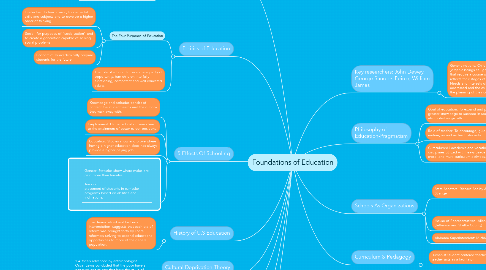
1. Key researchers: John Dewey, George Sanders Peirce, William James
1.1. Generic notions: Children are active ,organic beings still growing and changing that require a course of study that actively reflects their stages of development. Needs and interests of the child should be addressed and the child should partake in the planning of their course.
2. Sociological Perspectives
2.1. Functionalism is the school of thought that schools socialize students into the appropriate values. The natural state is said to be harmonious.
2.2. Interactalism reflects with working together and the impact that has on day to day lives
2.3. Conflict theory: Showing concern with the ways in which differences among groups at the societal level produce conflict and domination that may lead to change
3. Philosophy of Education-Pragmatism
3.1. Goal of education: To expand and provide greater knowledge to succeed in society, also noted as growth.
3.2. Role of teacher: To encourage, guide, nurture, as well as teach students.
3.2.1. Included
3.2.2. Included
3.2.3. Excluded
3.3. Curriculum:All academic and vocational disciplines utilized with heavy usage of cross- and multi-curriculum activities.
4. History of U.S Education
4.1. The democratic-liberal historical interpretation suggests that each era of reform was brought forth by liberal reformers striving to expand educational opportunities to more of the general population.
5. Politics of Education
5.1. The Four Purposes of Education
5.1.1. Intellectual: to teach basic, fundamental skills and subjects and to develop a higher order of thinking
5.1.2. Social: for purposes of "socialization" and to create a generation capable of solving social problems
5.1.3. Economic: To academically prepare students for the future
5.2. The role of school: To promote equality of opportunity, turn children into fully functioning, competent and well educated adults.
6. 5 Effects Of Schooling
6.1. Knowledge and attitudes:consist of content the student learns and the outlook they walk away with.
6.2. Employment: Higher education levels lead to the attainment of better career positions.
6.3. Education: Studies show and prove where having a higher education does not always provide a higher paying job.
6.4. Gender: Statistics show where males are paid more than females Tracking: placement of students in curricular programs based on abilities and inclinations.
7. Schools As Organizations
7.1. State Senators: Richard Shelby &Luther Strange
7.1.1. Representative on state school board: Jeffery Newman
7.1.2. Local School Board: Ron Mitchell-President JEFFCO
7.1.3. Local Superintendent: Dr. Greg Pouncey
7.2. House of Representatives: Allen Farley (Jefferson and Shelby County)
7.2.1. Representative on State Board:
7.3. Alabama Superintendent: Michael Sentance
8. Cultural Deprivation Theory
8.1. 1.A thesis advanced by anthropologist Oscar Lewis concluded that the poor have a deprived culture-one that lacks the value of a middle-class culture.
8.1.1. 2. Educationally disadvantaged students who achieve poorly because they have not been raised to acquire the skills required to excel in school Thus Project head start emerged
9. Educational Inequality
9.1. school climate
9.1.1. school finance
10. Equality of Opportunity
10.1. Class: Students in different social classes have different kinds of educational experiences. Different factors can effect this, the major one being the expense of school .
10.1.1. Race: An individuals race has a direct impact on how much education he or she is likely to achieve .
10.1.2. Gender: Historically an individuals gender was directly related to his or her educational success. Today those statics vary between men being better and math and ,more women attending post-secondary education schools.
